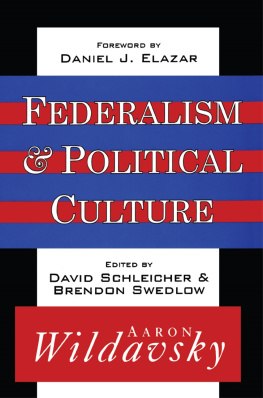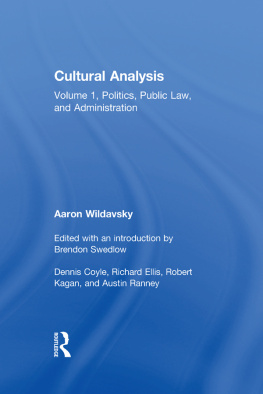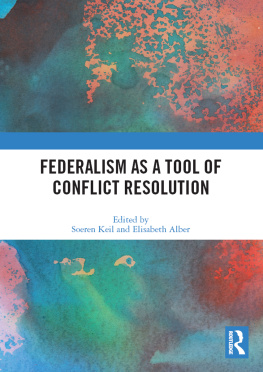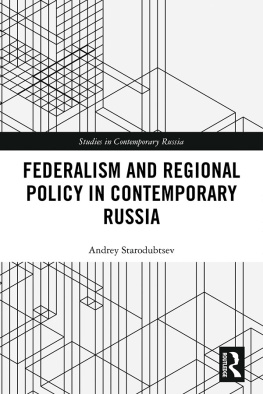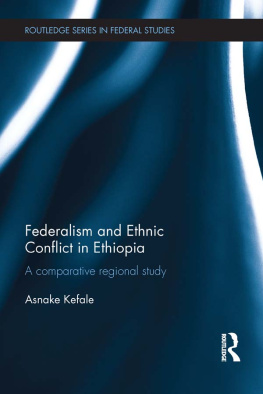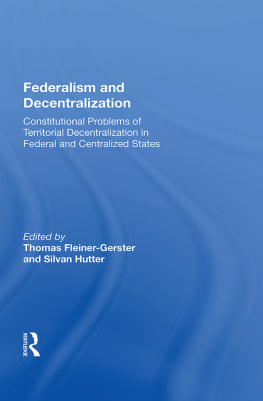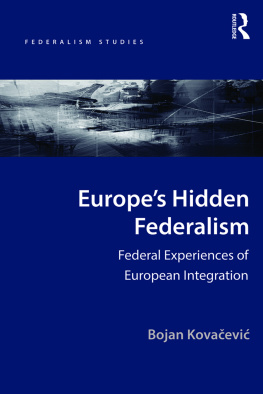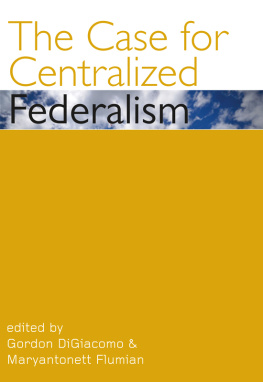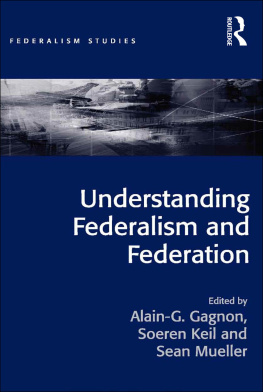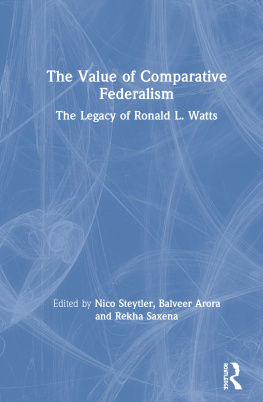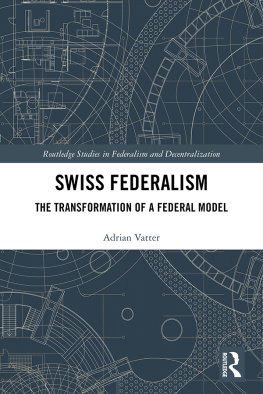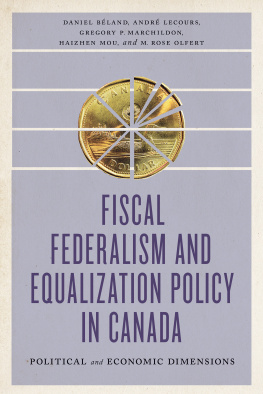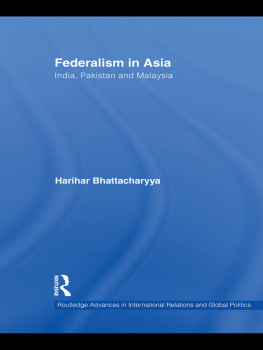FEDERALISM & POLITICAL CULTURE
FOREWORD BY
DANIEL J. ELAZAR
FEDERALISM & POLITICAL CULTURE
EDITED BY
DAVID SCHLEICHER & BRENDON SWEDLOW
Aaron Wildavsky
First published 1998 by Transaction Publishers
Published 2020 by Routledge
2 Park Square, Milton Park, Abingdon, Oxon OX14 4RN
605 Third Avenue, New York, NY 10017
Routledge is an imprint of the Taylor & Francis Group, an informa business
Copyright 1998 by Taylor & Francis
All rights reserved. No part of this book may be reprinted or reproduced or utilised in any form or by any electronic, mechanical, or other means, now known or hereafter invented, including photocopying and recording, or in any information storage or retrieval system, without permission in writing from the publishers.
Notice:
Product or corporate names may be trademarks or registered trademarks, and are used only for identification and explanation without intent to infringe.
Library of Congress Catalog Number: 9716719
Library of Congress Cataloging-in-Publication Data
Wildavsky, Aaron B.
Federalism and political culture / Aaron Wildavsky ; edited by David Schleicher and Brendon Swedlow ; with a foreword by Daniel Elazar.
p.cm.
Includes bibliographical references and index.
ISBN 1-56000-316-2 (alk. paper)
1. Federal governmentUnited States. 2. Political cultureUnited States. I. Schleicher, David. II. Swedlow, Brendon. III. Title.
JK325.W461997
ISBN 13: 978-1-138-51005-0 (pbk)
ISBN 13: 978-1-56000-316-8 (hbk)
DOI: 10.4324/9780429337260
was previously published as the introduction to The Costs of Federalism, edited by Robert Golembiewski and Aaron Wildavsky, New Brunswick, N.J.: Transaction Publishers, 1984.
was previously published as A Bias Toward Federalism: Confronting the Conventional Wisdom on the Delivery of Governmental Services, in Publius, vol. 6, no. 2, Spring 1976, pp. 95120.
was previously published in Society, vol. 22, no. 6, January/February 1985, pp. 4249.
was previously published in American Federalism: A New Partnership for the Republic, edited by Robert B. Hawkins, Jr., New Brunswick, N.J.: Transaction Publishers, 1982.
is a revised and combined version of A Double Security: Federalism as Competition, Cato Journal, vol. 10, no. 1, Spring/Summer 1990, pp. 3958 and The 1980s: Monopoly or Competition? Intergovernmental Perspective, vol. 6, no. 3, Summer 1980, pp. 1518.
Daniel J. Elazar
Aaron Wildavsky was a true federalist. He understood that federalism is about freedom and diversity, that it is noncentralization, not hierarchy and decentralization. He understood that compared to hierarchy, the kind emphasized in modern administration and the organization and governance of administrative states, federalism was on a different continuum and not only had to be understood differently but had to be valued differently, that federalism imposed its own set of values embodied in the norms of noncentralization.
Not only did Aaron Wildavsky believe this, he stated it boldly. He was nothing if not a clear, direct writer and speaker whose message was always presented in such a way as to make at least its principal points easily understood. One assumes that he understood that he was dealing with a world that, because of its preset notions, regularly reinforced from all sides, he, like all true federalists, would have difficulty hearing his message.
Since Aaron Wildavskys main interest in the study of federalism was to get the principle of noncentralization across, his writings on the subject are generally polemical. He did not hesitate to make his bias towards federalism clear and to hammer it home in the best way that he possibly could with his usual humor and elegance, with sharp turns of phrase and insightful analysis.
Aarons interest in federalism grew from the relatively straightforward influence of federalism on policy to an intensely normative concern with the promise of federalism and how that promise was being abandoned in the United States. Federalism, then, was part of Aaron Wildavskys game plan. It was not until perhaps fifteen or twenty years after our first meeting, when Aaron discovered that I and my colleagues who studied federalism also had a game, as he put it, and a game plan, that I began to understand what Aaron was really about. With his great intellect, diligence, and research skills that seemed from afar to lead him in many directions, he had a game that he was pursuing. He was to continue to pursue that gameincreasingly focused on political culture, federalism, and the Bible (his game in his way as it was mine in my way).
Aaron Wildavsky developed his interest in political culture in his mature years after much research experience. In a real sense, he reached political culture through Mary Douglas and the Bible. His studies of political culture, especially his identification of what he sensed was a critical division between hierarchy and equity, reinforced his belief in federalism. Preferring equity but recognizing the necessity of combining it with some measure of hierarchy to successfully govern flawed human beings only strengthened his belief that this synthesis could best be reached through federalism, both as the best and the most just form of government in an imperfect world. Given the political cultures of humanity, federalism would not only make the world safe for diversity but also governable. Yet the self-same human propensities also made the maintenance of federalism difficult. Hierarchy can very easily triumph over equity, not because people do not prefer the latter, but because of the power of those who prefer the former. He saw this story played out in the Bible and indeed saw this as one of the most profound dimensions of the Hebrew Scriptures, the great shift in the governance of the Israelites from Joseph the administrator to Moses the nursing father. He saw parallel phenomena in the United States in our own time and, learning from the Bible, he sought to warn Americans.
Aaron and I proceeded to meet often, in Jerusalem or Berkeley, in Tromso, Norway or Atlanta, wherever in the world we might find ourselves together in the same city. Not only did our friendship grow closer, but our agendas began to converge as well around federalism, political culture, and the Bible, each in our own ways, often agreeing, sometimes not, but hopefully always with mutual respect.
While, superficially, federalism did not appear to be a central topic in Wildavskys work, there was very little of his work, at least about American government and politics, that did not touch on it or in which it was not on his mind. For the last several years Aaron Wildavsky had intended to write a book about federalism, and he and I discussed it from time to time. He was distracted from that task by a task that he apparently and correctly considered a prior one, identifying the different forms of political culture that shaped humans as political people and hence were necessary for the understanding of federalism, indeed all politics. We came fairly close to identifying similar political cultural categories. I had come to realize a similar necessity myself and had written about it beginning some years earlier. While we used different terminology, there, too, we were reaching out to the same phenomenon, only to somewhat different aspects of it.

